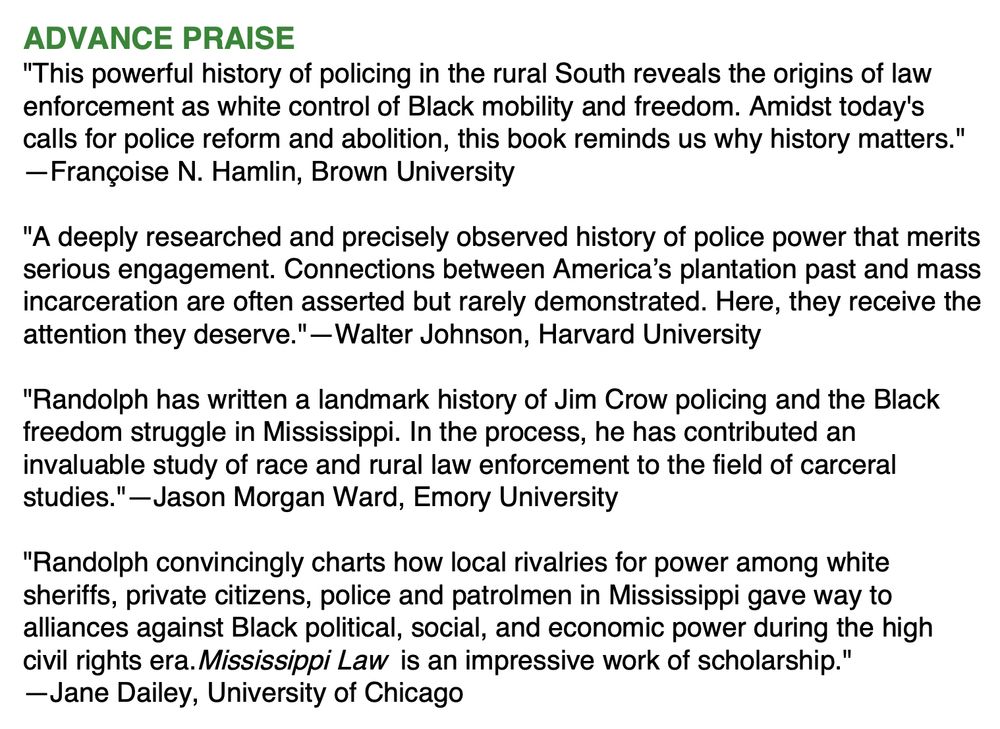
When Stephen Miller hijacks the Major League Baseball social media account
06.10.2025 20:21 — 👍 4460 🔁 672 💬 57 📌 22@randolphjustin.bsky.social
U.S. historian | author of *Mississippi Law* | reader, eater, friend, southern https://orcid.org/0000-0003-4000-5060

When Stephen Miller hijacks the Major League Baseball social media account
06.10.2025 20:21 — 👍 4460 🔁 672 💬 57 📌 22


obligatory unboxing photos of *Mississippi Law* author copies from @uncpress.bsky.social! and check out the GENEROUS blurbs from Jane Dailey, Françoise Hamlin, Walter Johnson, and Jason Ward. they put a smile on my face. uncpress.org/978146968948...
05.10.2025 20:32 — 👍 11 🔁 3 💬 0 📌 1oh lord. Will their table be in the same place the segregationist authorities created a stockade for civil rights workers in 1963/65?
01.10.2025 01:01 — 👍 4 🔁 0 💬 0 📌 0
between the HPAD response and this in the Boston Review, Joan Scott’s recent writing is really helping me think through the moment. www.bostonreview.net/articles/a-g...
19.09.2025 16:08 — 👍 2 🔁 2 💬 1 📌 0
A moving, searching essay by @bethlewwilliams.bsky.social, who has an important new book, “John Doe Chinaman.” www.newyorker.com/news/the-wee...
13.09.2025 13:42 — 👍 23 🔁 10 💬 1 📌 0
LAWCHA Statement on the Unjust Firing of Professor Thomas Alter
12.09.2025 19:02 — 👍 24 🔁 15 💬 3 📌 05- alarm fire for academic freedom in Texas, should be of concern to all. The kinds of attacks on teachers and restrictions on content matter (esp. race and gender) we see in K-12 are invading universities. This week 2 faculty, a chair, and a dean were fired. /1
www.oah.org/2025/02/05/o...
Thanks to the @naucivilwar.bsky.social for the opportunity to serve on this year's book prize committee. If you authored a book on the Civil War in 2025, consider asking your publisher to submit it for this prestigious prize. Click the link for the details. 🗃️ naucenter.as.virginia.edu/nau-book-prize
11.09.2025 00:00 — 👍 15 🔁 2 💬 0 📌 0
Ooh. Maybe this one??
30.08.2025 22:12 — 👍 0 🔁 0 💬 0 📌 0this post is hall of fame material
30.08.2025 21:10 — 👍 1 🔁 0 💬 1 📌 0
Book cover of Archie Bunker for President: How One Television Show Remade American Politics by Oscar Winberg.
Archie Bunker for President is now available for pre-order on the UNC Press site!!
Pre-ordering is the best way of support a book so please consider heading over to the @uncpress.bsky.social site and make sure to use the code 01SOCIAL30 at checkout to save 30%!!

Hey friends, it would mean a lot to me if you took a minute to sign this petition to defend my friends and colleagues at my alma mater. Cuts to Oregon’s humanities are widespread and devastating, and I genuinely fear for the future of intellectual life at UO.
actionnetwork.org/petitions/fi...
🚨 50% off all @uncpress.bsky.social books 🚨
I interrupt my usually long silence between self-promotions to say that my book can be had for $18.35 with code 01NEWSITE50 at checkout. and FREE SHIPPING on orders >$75 uncpress.org/978146968948...
hit this Linktree for purchase options: linktr.ee/MississippiLaw
22.08.2025 16:31 — 👍 0 🔁 0 💬 0 📌 0



*Mississippi Law* is two months away! Don’t believe me? Just look at these proofs! Table of contents too.
22.08.2025 16:25 — 👍 1 🔁 2 💬 1 📌 1
don’t know about writing but remember a recent case from Tennessee? abcnews.go.com/amp/US/wireS...
20.08.2025 23:51 — 👍 1 🔁 0 💬 1 📌 0some rare good news: a Georgia judge has dismissed the Cop City domestic terrorism charges against Jamie Mariscano in DeKalb County, noting that the "Attorney General's Office appears to have delayed this matter in order to gain a tactical advantage over the defense."
14.08.2025 20:36 — 👍 705 🔁 182 💬 2 📌 1"Mass protests have demonstrated a wide range of disagreement with the [fascist] agenda. But we need smaller local and regional networks to build a more rooted, sustained opposition.” ~Keeanga-Yamahtta Taylor
14.08.2025 11:38 — 👍 5 🔁 1 💬 1 📌 0
a great piece on Black family reunions and the amazing Jack Johnson family of Kemper County, Mississippi www.theguardian.com/culture/2025...
09.08.2025 17:54 — 👍 0 🔁 0 💬 0 📌 0
Watercolor. Flowers against a yellow rising moon or setting sun. Words by Mike Davis: It’s what ordinary people have to do. You have to live each other. You have to defend each other. You have to fight.
Instructions for today. And every day.
04.08.2025 13:23 — 👍 14 🔁 7 💬 1 📌 0The attempt to ban, erase etc.. marginalized people's histories demands responses at the grassroots level. Regular people can be cultural stewards, can be archivists, can be storytellers, can be preservers of oral history. And these are all fun things to do!
03.08.2025 14:27 — 👍 197 🔁 60 💬 2 📌 0
NEW visual investigation:
ICE agents are smashing car windows & grabbing the people inside
There's footage of sobbing kids, pregnant women, & bloodied faces
We found ~50 cases but no civilians w/ sig criminal records
Insiders told us this used to be rare
projects.propublica.org/trump-ice-sm...

🚨NEW: Local jails & police departments are playing a key role in Trump’s mass arrest & deportation agenda
The actual scope of this collaboration – and the true scale of immigrant arrests and detentions – has not been publicly available, until now 🧵
This idea is so bad that when the guy from Axon proposed it his entire board resigned in protest.
28.07.2025 12:44 — 👍 652 🔁 225 💬 28 📌 12
Four stickers against a pink background: 1) “we are born in flames” written against fire, 2) two arms clutching one another with “your risk is my risk” etched upon them, 3) a woman in a bathtub with the words “my home is not your asset” written on the tub, 4) an apartment building with a fire escape and clothesline, tomato and sunflower plant, and residents waving to each other, reading “tenants built this city”
The BORN IN FLAMES stickers are here and they’re beautiful! Made in collaboration with my dear friend, Jenna Peters-Golden, + an original by Mary Tremonte
@justseeds.bsky.social, these will be sent to you free if you order BORN IN FLAMES by Aug 19th and submit here: tinyurl.com/4nx7rcv8

Starred review from @publisherswkly.bsky.social says The Radical Fund is “an immense and essential achievement” with an “exhilarating range of figures” and “stark parallels with the present.” www.publishersweekly.com/9781476765877
26.07.2025 12:22 — 👍 38 🔁 15 💬 1 📌 1going to keep saying: important for a society that would like to keep functioning to discourage baldfaced lying, especially by authorities
27.07.2025 19:23 — 👍 833 🔁 191 💬 10 📌 4